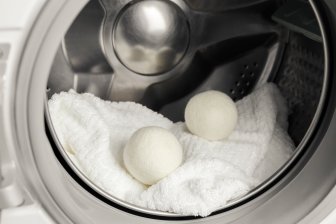Stacey Dary always knew she wanted to be a mother. When she turned 39, and still hadn’t met a partner, she figured it was time to secure that dream in a practical way by freezing her eggs. An acquaintance who had been through IVF encouraged her to go one step further.

“She said: ‘Don’t just freeze your eggs, you can do this! You can be a mom. You’re an educated woman, you have a good income. You can do this.’ So I met with the doctor at her clinic and decided, yes, I can do this.”
Dary attempted IVF with donor sperm over the next few years, but each pregnancy ended in a miscarriage. She eventually became pregnant with the help of a donor egg and gave birth to her daughter Delaney in January 2019.
“It’s pretty amazing. It’s everything everyone says it’s going to be. Your heart is open and expanded 10 times.”
Dary used U.S. donor sperm to conceive but some other Canadian women choose sperm from friends or acquaintances to build their families.
As of Feb. 4, a change to Health Canada regulations makes doing so easier and cheaper, according to infertility specialist Dr. Caitlin Dunne.
We spoke with Dunne to find out how this affects Canadians.
Laurel Gregory: For the average person, tell me how the sperm donation process worked before and how this regulatory change will improve that process for people wanting to build a family?
Dr. Caitlin Dunne: As of Feb. 4, 2020, there is a new regulation and guidance document from Health Canada that will give more options — or more autonomy — to women for choosing their sperm donor. What I mean by that is, in the past if a woman wanted to use donor sperm, primarily they were doing that with frozen donor sperm via a sperm bank in the United States. Those sperm donations could be open or they could be anonymous. The frozen donor sperm would ship to a local fertility clinic for use either in in vitro fertilization (IVF) or intrauterine insemination (IUI).
If the woman wanted to use a friend for a sperm donor, that was possible, but there were more obstacles in place. So that known sperm donor would have to have given the sample at a place that was a designated processor and distributor of donor sperm.

Here in Western Canada we were sending people to Toronto for that purpose and then the sperm was quarantined for 180 days while the known donor was tested for infectious diseases and then retested.
So it was certainly possible but there were more obstacles.
With the new regulations, if a woman wants to use a friend or a known donor for reproductive purposes, that can be done through a local fertility clinic, and we don’t have to wait the 180-day quarantine period.
READ MORE: The frustration and struggle behind an ‘unexplained infertility’ diagnosis
LG: Does the sperm still undergo those safety checks? Even though it isn’t quarantined, is it still tested for all of those things?
CD: Absolutely. Safety is of the utmost importance. So, if a woman has a sperm donor, for example, a friend, then he would be seen at the fertility clinic for a full assessment. That would include infectious diseases testing, genetic testing and a physical examination. All of that testing needs to be up to date before the sperm is donated and kept up to date every three months for future donations.

LG: So the obstacle would be… Let’s say there’s a Vancouver single mom and she wanted to use the sperm. Would she have to fly to that Toronto clinic, for example, to get IVF or IUI?
CD: In the past she would have because in the past there needed to be designated facilities that were processors and distributors of donor sperm. But now, with the new regulations, the local fertility clinics are able to perform the donor screening. And the woman is given more autonomy about the donor. So, for example, if anything were to show up on the genetic testing, or on the health screening, the woman would be given a choice after appropriate counselling if she wanted to still use that donor rather than just having that donor eliminated from the pool.
READ MORE: Social egg freezing on the rise as more women embrace single parenthood
LG: So when we talk about obstacles for the average person… I would have been faced with the prospect of waiting six months for that quarantine period and then, on top of that, spending probably a few thousand dollars to send a friend to donate sperm to Toronto.
CD: I think that’s a reasonable summary.
That’s why most women were opting for donor sperm from sperm banks, which are worldwide, but largely in Canada the sperm is obtained from the U.S.
And let’s not forget that that sperm comes at a cost of generally about $800 to $1,000 per unit. With the success rates from insemination in vitro fertilization, although they are very good, it’s not 100 per cent. So often times you will need to buy more than one unit to achieve a pregnancy. So with the new regulations, if a same sex female couple or if a single woman has a local man who is willing to altruistically give sperm then there would obviously be more autonomy than using the donor, as well as possibly a cost savings.
LG: What excites you most about this option?
CD: The new regulations treat donor eggs and donor sperm similarly so that eliminates discrimination and I think it’s a step forward that we are giving women more autonomy in choosing their donor.






Comments